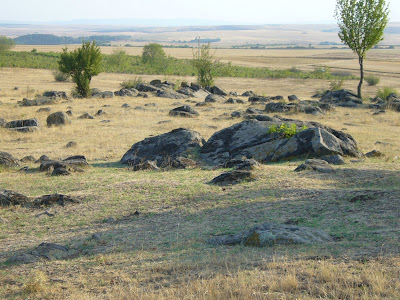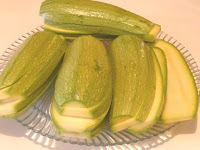 The produce is rolling off the land now both in town and country. The food we eat at lunchtime and evenings nearly always has home grown produce in it. It is exciting have the end product on you plate and tasting as good as it does. There is something very special about doing something like this.
The produce is rolling off the land now both in town and country. The food we eat at lunchtime and evenings nearly always has home grown produce in it. It is exciting have the end product on you plate and tasting as good as it does. There is something very special about doing something like this.Let’s start and see what on the dinner table on a day-to-day basis right now. We have had a continuous supply of onions and garlic and these will last us right through the winter. The lettuce now has finished its season and the space that was left has been filled with more peppers. After May it becomes too hot for lettuce here and you can’t freeze or preserve it.
 The strawberries were the next; we had two crops and are still in the middle of the second. Not enough o make jam with but this is the first year they have been laid down. Always enough for a family dessert at the weekend as they are grown in the village. I am not too sure whether I will keep these here next year. The reason is they need watering regularly for a good harvest and that isn’t happening, hence the relatively small fruits we are getting from them. Also, they need to be harvested every day and that isn’t happening either so a lot of waste form over-ripe fruit each weekend.
The strawberries were the next; we had two crops and are still in the middle of the second. Not enough o make jam with but this is the first year they have been laid down. Always enough for a family dessert at the weekend as they are grown in the village. I am not too sure whether I will keep these here next year. The reason is they need watering regularly for a good harvest and that isn’t happening, hence the relatively small fruits we are getting from them. Also, they need to be harvested every day and that isn’t happening either so a lot of waste form over-ripe fruit each weekend.The beans I though was going to be a complete failure. I planted 12 rows of beans and only two survived. I didn’t know why. Locals tell me that the seeds were old, but I felt that the two rows that did survive would indicate another reason, perhaps over-watering. Anyway the crops that come from the ones that survived where great. We got at least 8 kg of superb white beans from just that little crop.
 The potatoes looked fantastic with the foliage and flowering more pertaining to a flowerbed than a potato crop. All the Colorado beetle and other gorging vegetarian insects were contained with no damage throughout the crop. There was however a massive disappointment on pulling up the first crop. Only a couple of potatoes were found and they were the size of golf ball. It was later realised that this was the shallow end of the troughs made for the watering and apart from the first couple of plants that stood there the rest were a fine crop. It is such a joy to see some potatoes of different shapes rather than the uniformed specimens in imported potatoes in supermarkets.
The potatoes looked fantastic with the foliage and flowering more pertaining to a flowerbed than a potato crop. All the Colorado beetle and other gorging vegetarian insects were contained with no damage throughout the crop. There was however a massive disappointment on pulling up the first crop. Only a couple of potatoes were found and they were the size of golf ball. It was later realised that this was the shallow end of the troughs made for the watering and apart from the first couple of plants that stood there the rest were a fine crop. It is such a joy to see some potatoes of different shapes rather than the uniformed specimens in imported potatoes in supermarkets.The beans and potatoes made into a soup by Baba and we just couldn’t get enough of it eaten hot or cold or in a secret raid of the fridge between meals.
Other crops aren’t quite ready yet and we can’t wait. This will be the most successful season growing here because for the first time I have been listening and watching and copying the Bulgarians. Still never as good and it never will, they just seem to have the magic touch with growing here, but I will improve each time I’m sure.



























